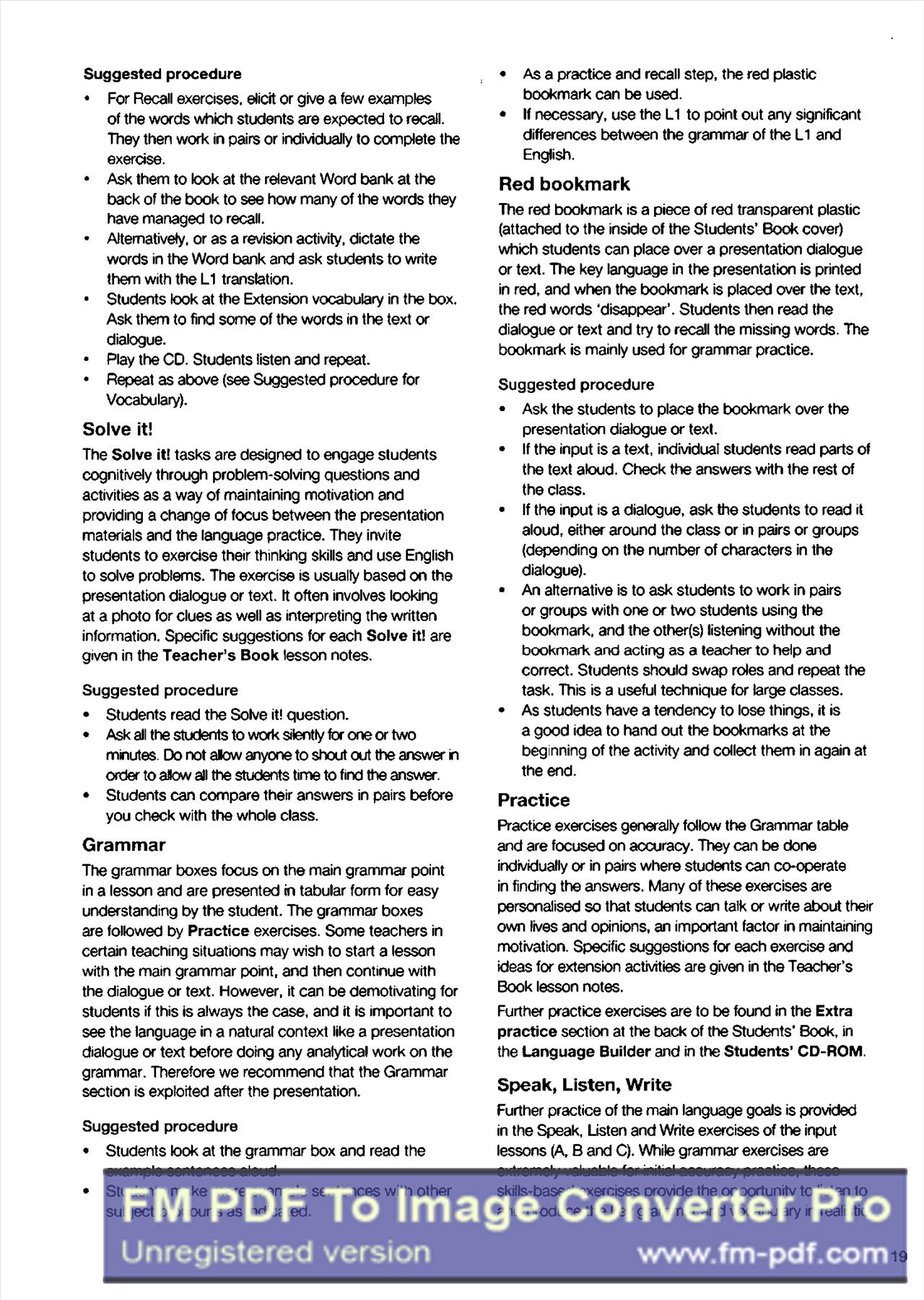Up¾at 3 Teacher's Book podrecznik nauczyciela plus odpowiedzi ,testy,klucz answer key Page 018

Suggested procedurÄ™
• For Recall exercises, elicit or give a few examples of the words which students are expected to recall. They then work in pairs or individually to complete the
exerdse.
• Ask them to look at the relevant Word bank at the back of the book to see how many of the words they have managed to recall.
• Altemativeły, or as a revision activity, dictate the words in the Word bank and ask students to write them with the L1 translation.
• Students look at the Extension vocabulary in the box. Ask them to find some of the words in the text or dialogue.
• Play the CD. Students iisten and repeat.
• Repeat as above (see Suggested procedurę for Vocabulary).
Solve it!
The Solve it! tasks are designed to engage students cognitively through problem-solving questions and activities as a way of maintaining motivation and providing a change of focus between the presentation materials and the language practice. They invite students to exercise their thinking skills and use English to solve problems. The exercise is usualty based on the presentation dialogue or text. ft often involves looking at a photo for clues as well as interpreting the written information. Specific suggestions for each So!ve it! are given in the Teacher’s Book lesson notes.
Suggested procedurÄ™
• Students read the Solve it! question.
• Ask all the students to worksilently for one ortwo minut es Do not alow anyone to shout out the answer h order to aSow all the students time to find the answer.
• Students can compare their answers in pairs before you check with the whole class.
Grammar
The grammar boxes focus on the main grammar point in a lesson and are presented in tabular form for easy understanding by the student. The grammar boxes are followed by Practice exercises. Some teachers in certain teaching situations may wish to start a lesson with the mam grammar point, and then contmue with the dialogue or text. However. it can be demotivating for students if this is always the case, and it is important to see the language in a natura! context like a presentation dialogue or text before doing any analytical work on the grammar. Therefore we recommend that the Grammar section is exploited after the presentation.
• As a practice and recall step, the red plastic bookmark can be used.
• If necessary, use the L1 to point out any significant differences between the grammar of the L1 and Engłish.
Red bookmark
The red bookmark is a piece of red transparent plastic (attached to the inside of the Students’ Book cover) which students can place over a presentation dialogue or text. The key language in the presentation is printed in red, and when the bookmark is placed over the text, the red words ‘disappear’. Students then read the dialogue or text and try to recall the missing words. The bookmark is mainly used for grammar practice.
Suggested procedurÄ™
• Ask the students to place the bookmark over the presentation dialogue or text.
• If the input is a text, individual students read parts of the text aloud. Check the answers with the rest of the class.
• If the input is a dialogue, ask the students to read it aloud, either around the class or in pairs or groups (depending on the number of characters in the dialogue).
• An afternative is to ask students to work in pairs or groups with one or two students using the bookmark. and the other(s) listening without the bookmark and acting as a teacher to help and correct. Students should swap roles and repeat the task. This is a useful technique for large classes.
• As students have a tendency to lose things, it is a good idea to hand out the bookmarks at the beginning of the activity and collect them in again at the end.
Practice
Practice exercises generally follow the Grammar table and are focused on accuracy. They can be done individually or in pairs where students can co-operate in findmg the answers. Many of these exercises are personalised so that students can talk or write about their own lives and opinions, an important factor in maintaining motivation. Specific suggestions for each exercise and ideas for extensbn activities are given in the Teacher’s Book lesson notes.
Further practice exercises are to be found in the Extra practice section at the back of the Students’ Book, in the Language Builder and in the Students’ CD-ROM.
Speak, Listen, Write
Further practice of the main language goaJs is provided
Suggested proceduro jn the Speak, Listen and Write exercises of the input
• Students look at the grammar box and read the lessons (A, B and C). While grammar exercises are

Wyszukiwarka
Podobne podstrony:
Up?at 3 Teacher s Book podrecznik nauczyciela plus odpowiedzi ,testy,klucz answer key Page 081 5 has
Up?at 3 Teacher s Book podrecznik nauczyciela plus odpowiedzi ,testy,klucz answer key Page 123 BACK
Up?at 3 Teacher s Book podrecznik nauczyciela plus odpowiedzi ,testy,klucz answer key Page 001 FM PD
Up?at 3 Teacher s Book podrecznik nauczyciela plus odpowiedzi ,testy,klucz answer key Page 005 Conte
Up?at 3 Teacher s Book podrecznik nauczyciela plus odpowiedzi ,testy,klucz answer key Page 006 Conte
Up?at 3 Teacher s Book podrecznik nauczyciela plus odpowiedzi ,testy,klucz answer key Page 009 FM PD
Up?at 3 Teacher s Book podrecznik nauczyciela plus odpowiedzi ,testy,klucz answer key Page 010 : Rea
Up?at 3 Teacher s Book podrecznik nauczyciela plus odpowiedzi ,testy,klucz answer key Page 012 Large
Up?at 3 Teacher s Book podrecznik nauczyciela plus odpowiedzi ,testy,klucz answer key Page 013 u mfo
Up?at 3 Teacher s Book podrecznik nauczyciela plus odpowiedzi ,testy,klucz answer key Page 014 selec
Up?at 3 Teacher s Book podrecznik nauczyciela plus odpowiedzi ,testy,klucz answer key Page 015 MMMMM
więcej podobnych podstron